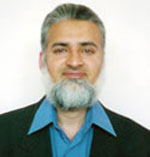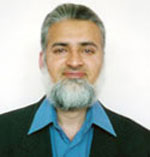


Dr. Mohammad Amjad Kamal was born in Pakistan in 1962. He received an MSc (1986) from Gomal University, and a PhD (1999) from Islamia University, Pakistan.
In 2000 the School of Molecular and Microbial Biosciences, University of Sydney awarded Dr. Kamal Postdoctoral Fellowship.
This three year award supported and funded Dr. Kamal's research on ”Inhibition of amido phosphoribosyltransferase by new antifolates: Design and mechanism of action of purine antagonists". It additionally supported Dr. Kamal's career objective to discover new drugs for the treatment of Alzheimer's and related neurodegenerative diseases. His research interests include defining and elucidating the function and biochemistry of critical enzyme targets in the medical treatment of Alzheimer's disease and key enzymes involved in the metabolism and activation of cancer drugs. A significant segment of Dr. Kamal's research career was spent at King Saud University, Saudi Arabia, elucidating the interaction of various chemicals and drugs (both anti-cancer and Alzheimer's agents) on the key enzyme acetylcholinesterase, which culminated in about 40 publications in international journals, and numerous conference presentations. In a similar manner, Dr. Kamal's present studies are aiding in the development of other novel agents, cymserine and analogues, to test the radically new hypothesis that selective butyrylcholinesterase inhibition is of value in the therapy of Alzheimer's disease.
Dr. Kamal's research at the University of Sydney focuses on the inhibition of the rate-limiting enzyme, amido phosphoribosyltransferase, which catalyses the first committed step of the de novo purine pathway. Kamal and his collaborators, Greig and Al-Jafari, published the article, “A new, simple and economical approach to analyze the inhibition kinetics of acetylcholinesterase using Tolserine” in the Emirates Medical Journal (EMJ) during 2002. This article was selected for the Hamdan Award for original research. This publication describes a simple and rapid means to analyze the fundamental kinetics of enzyme inhibitors, exemplified by assessing the inhibition kinetics of the new Alzheimer’s disease drug candidate, tolserine, for acetylcholinesterase (AChE). This enzyme is responsible for hydrolyzing the cholinergic neurotransmitter, acetylcholine, which, through its autonomic system actions, is essential to life and, through its actions within the brain, is central to memory and cognition. The described approach proved to be highly economical, as relatively little enzyme, substrate and inhibitor are required as compared to conventional analysis to obtain Lineweaver-Burk and Dixon plots to characterize kinetics. Furthermore, the values of the kinetic parameters appeared to be reliable, compared to conventional analysis, and the approach allowed the description and calculation of new kinetic constants. Utilizing this novel analysis, tolserine proved to be a highly potent inhibitor of human erythrocyte AChE, which supports previous reports of its unusually high potency for selectively inhibiting AChE, compared to the classic alkaloid, physostigmine, and its structural analogue, phenserine, that is in currently phase 3 clinical trials for Alzheimer’s disease. This approach and the new short-cut inhibition kinetic constants that it provides can be widely applied and will hopefully aid our understanding of the mechanism of inhibition and kinetic analysis of several crucial physiological enzymes by a wide assortment of inhibitors both in vitro and during health, aging and disease.
Dr. Mohammed Amjad Kamal is awarded for his original article published in the Emirates Medical Journal for the year 2003-2004.